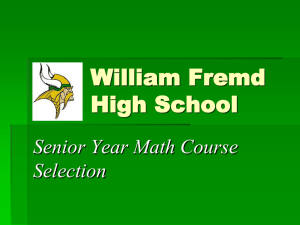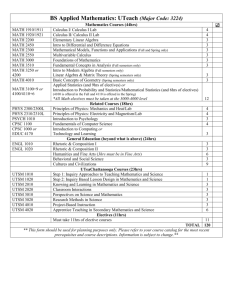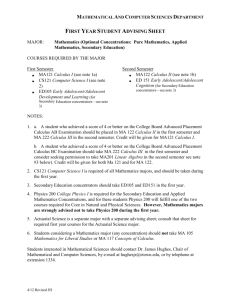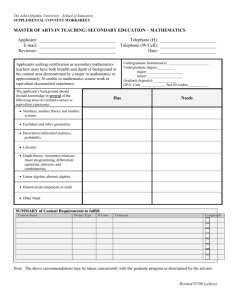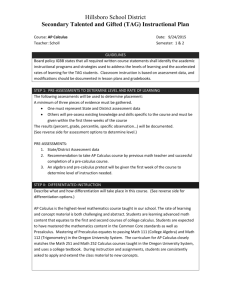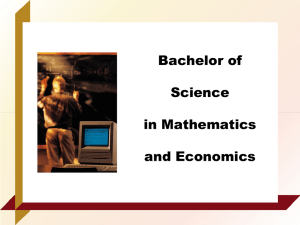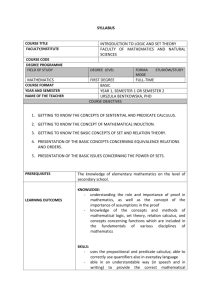Intent to Enroll for New 10th
advertisement
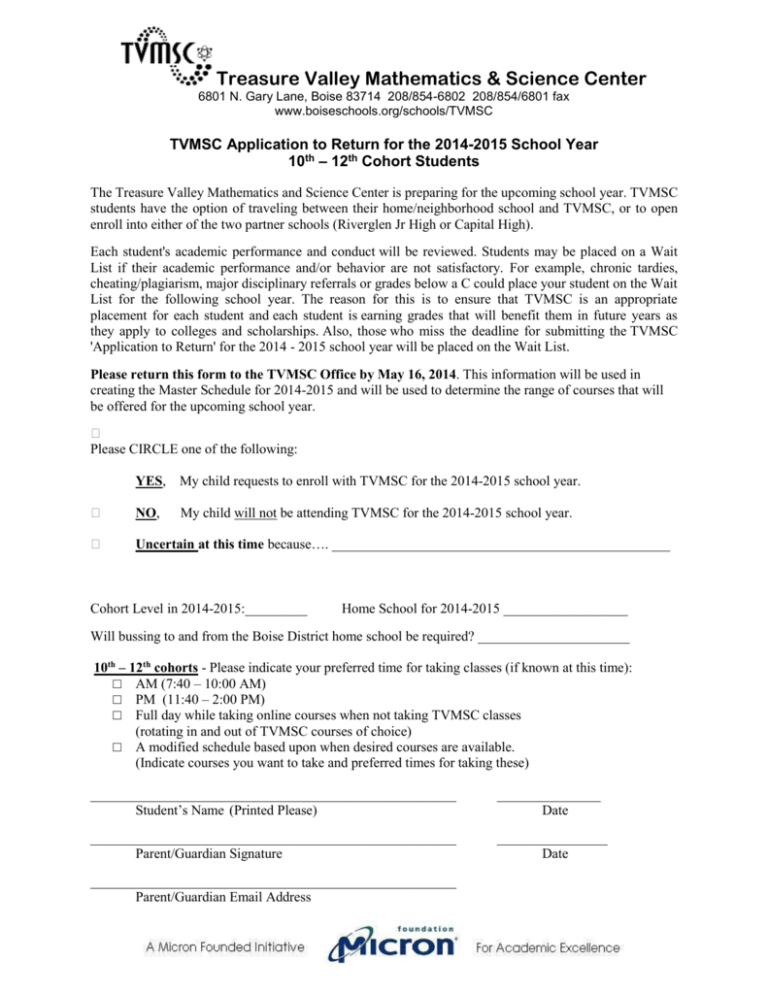
Treasure Valley Mathematics & Science Center 6801 N. Gary Lane, Boise 83714 208/854-6802 208/854/6801 fax www.boiseschools.org/schools/TVMSC TVMSC Application to Return for the 2014-2015 School Year 10th – 12th Cohort Students The Treasure Valley Mathematics and Science Center is preparing for the upcoming school year. TVMSC students have the option of traveling between their home/neighborhood school and TVMSC, or to open enroll into either of the two partner schools (Riverglen Jr High or Capital High). Each student's academic performance and conduct will be reviewed. Students may be placed on a Wait List if their academic performance and/or behavior are not satisfactory. For example, chronic tardies, cheating/plagiarism, major disciplinary referrals or grades below a C could place your student on the Wait List for the following school year. The reason for this is to ensure that TVMSC is an appropriate placement for each student and each student is earning grades that will benefit them in future years as they apply to colleges and scholarships. Also, those who miss the deadline for submitting the TVMSC 'Application to Return' for the 2014 - 2015 school year will be placed on the Wait List. Please return this form to the TVMSC Office by May 16, 2014. This information will be used in creating the Master Schedule for 2014-2015 and will be used to determine the range of courses that will be offered for the upcoming school year. Please CIRCLE one of the following: YES, My child requests to enroll with TVMSC for the 2014-2015 school year. NO, Uncertain at this time because…. _________________________________________________ My child will not be attending TVMSC for the 2014-2015 school year. Cohort Level in 2014-2015:_________ Home School for 2014-2015 __________________ Will bussing to and from the Boise District home school be required? ______________________ 10th – 12th cohorts - Please indicate your preferred time for taking classes (if known at this time): □ AM (7:40 – 10:00 AM) □ PM (11:40 – 2:00 PM) □ Full day while taking online courses when not taking TVMSC classes (rotating in and out of TVMSC courses of choice) □ A modified schedule based upon when desired courses are available. (Indicate courses you want to take and preferred times for taking these) _____________________________________________________ Student’s Name (Printed Please) _______________ Date _____________________________________________________ Parent/Guardian Signature ________________ Date _____________________________________________________ Parent/Guardian Email Address Treasure Valley Mathematics & Science Center 6801 N. Gary Lane, Boise 83714 208/854-6802 208/854/6801 fax www.boiseschools.org/schools/TVMSC Course descriptions are on our website at http://treasurevalley.school.boiseschools.org/ If your student will be in the 10th, 11th or 12th cohorts they can choose from any of the courses listed below. Choose your Math class by checking one of the boxes below: □ Pre-calculus □ AP Calculus AB/BC □ Discrete Mathematics (for those who complete AP Calculus AB and BC) □ Multivariable and Vector Calculus (for those who complete AP Calculus AB and BC) ****************************************************************************** Elective Choices (PREREQUISITE REQUIRED): Advanced Computer Science: Algorithms and Game Design (AP Comp. Sci) Pre-Engineering (Already completed or concurrently enrolled in AP Physics) AP Physics C (AP Physics 1) AP Biology (AP Chemistry or Received an A in Accelerated Biology) TVMSC Internship (Must be in 11th and 12th cohort) – See Ms. Ekhoff for separate application. Elective Choices (No prerequisite required): AP Environmental Science AP Physics 1 AP Computer Science AP Statistics Forensics Pre-Med Geology AP Chemistry Astronautics Write down your top four choices of electives in order of your top choice to your last. 1. ________________________________ 2. ________________________________ 3. ________________________________ 4. ________________________________ Please return this form to the TVMSC Office by May 16, 2014. Please email or call with any questions or concerns that you might have. holly.maclean@boiseschools.org Thank you, Dr. Holly MacLean Principal of TVMSC 854-6800 - office Treasure Valley Mathematics & Science Center 6801 N. Gary Lane, Boise 83714 208/854-6802 208/854/6801 fax www.boiseschools.org/schools/TVMSC TVMSC Course Options and Descriptions for 10th – 12th Cohorts * Accel. Pre-Calculus * AP Calculus AB/BC (TVMSC covers the 3 semesters of material in 2 semesters) * AP Calculus BC (for students who took AP Calculus AB somewhere else) Discrete Mathematics (for those who complete AP Calculus AB and BC) “Discrete Mathematics is appropriate for students who have interest in more abstract mathematical ideas. Most of these students go on to pursue Computer Science, Business Mathematics and Statistics, Mathematics and Economics or Mathematics degrees. As a course for TVMSC students in their junior or senior years, Discrete Math provides students who have advanced mathematical knowledge further opportunities to explore mathematical reasoning, combinatorial analysis, discrete structures, algorithmic thinking, and enhanced problem solving skills through modeling. This course studies the mathematical elements of propositional logic, predicate logic, sets, functions and relations, combinatorics, mathematical induction, recursion, algorithms, matrices, graphs, trees, and Boolean logic. Students learn to recognize and express the mathematical ideas graphically, numerically, symbolically, and in writing. Discrete mathematics is that part of mathematics dealing with finite sets of objects. Discrete mathematics is to be contrasted with "continuous" mathematics, for example the classical theory of calculus. Its rise in popularity coincides with the rise of the computer. Many real-world problems are inherently discrete.” * * Multivariable and Vector Calculus (for those who complete AP Calculus AB/BC) This course is appropriate for students who have interest in pursuing more advanced Calculus beyond the AP Calculus options. Multivariable and Vector Calculus requires a solid foundation in the calculus of functions of a single variable: both differentiation and integrations are used extensively in this course. Multivariable and Vector Calculus is an introduction to the geometry of curves and two and three - dimensional regions, and the calculus of vector-valued functions and functions of more than one variable. This course includes vector algebra and geometry, iterated integrals, parametric curves and surfaces, vector fields, divergence and curl, line and surface integrals, Green’s, Stokes’s and divergence theorems. There will also be some use of software such as Maple for visualizations, exploration, and solutions of real-world problems. AP Statistics “TVMSC’s AP Statistics course explores data and patterns, methods of sampling and experimental design, probability and simulations, as well as the process for the development and testing of hypotheses and statistical inference. This course prepares TVMSC students well for future research-based internship experiences.” Practical applications will be encouraged through projects and activities throughout the year. * AP Physics B “TVMSC’s AP Physics B includes topics from both classical and modern physics. A thorough knowledge of algebra, geometry and basic trigonometry is required, but basic ideas of calculus will also be utilized. AP Physics B will focus on five content areas including Newtonian mechanics, fluid mechanics and thermal physics, electricity and magnetism, waves and optics, and atomic and nuclear physics. This course will include a significant hands-on, lab-based component, with lab notebooks.” * * AP Physics C AP Physics C includes topics that focus on more advanced coverage of mechanics, electricity and magnetism, waves and optics. AP Environmental Science “TVMSC’s AP Environmental Science course explores the interrelationships of the natural world, identifies and explores environmental problems that are both natural and man-made. Topics covered include energy conversions within ecological processes and the ways that Earth is one interconnected system. The course will also study ecology and conservation practices. This course will carry a significant hands-on, lab-based component.” * Treasure Valley Mathematics & Science Center 6801 N. Gary Lane, Boise 83714 208/854-6802 208/854/6801 fax www.boiseschools.org/schools/TVMSC AP Biology “TVMSC’s AP Biology course focuses on three primary areas of study: Molecules and Cells, Heredity and Evolution, and Organisms and Populations. Additional units of study investigate energy transfer, interdependence within systems, and the relationships of structure to function. This course will include a significant hands-on, lab-based component that includes field research and real-world studies.” * AP Chemistry “TVMSC’s AP Chemistry course investigates topics that include Structure of Matter, States of Matter, and Chemical Reactions (reaction types, stoichiometry, equilibrium, kinetics and thermodynamics). Background content will also focus on relationships in the periodic table and exploration of organic chemistry, including hydrocarbons and functional groups. This course will carry a significant hands-on, lab-based component.” * AP Computer Science “TVMSC’s AP Computer Science course is designed to include the concepts of AP Computer Science A and AB using the Java Language and OOP (object-oriented design). Students are expected to gain proficiency in the Java language including using it to create, modify, and implement classes. The course immerses student in the history of computing and ethics of computing, as well as legal and intellectual property issues, privacy, security and reliability, and social and ethical ramifications of computer use. The course will also focus on the programming environment and the cycle of designing, implementing, testing, and debugging inherent to programming and computer science. Students will be creating, modifying and testing their own code creations. Students work on various types of lists, sets, and iterations, and go on to explore operations on array lists, and data structures such as doubly- and singly-linked lists, as well as queues. Class time is spent primarily doing design, programming, and testing on computers and text support, with short lectures on important topics. Practical applications will be encouraged through projects and activities throughout the year.” * * Advanced Computer Science: Algorithms & Game Design will be a junior/senior-level course in data structures, algorithms, and the process of game design for students who have already taken AP Computer Science. The objective of the course is to present a number of fundamental techniques to solve common programming problems efficiently, as well as looking at the implementation of those techniques into the programming logic that runs computer games. Additionally, we will investigate the process that developers use to create games including conceptualization, specification, design, implementation, and evaluation. * Introduction to Astronautics is the science and technology of spaceflight. The course explores the history of rocketry and space flight. The fundamentals of astronautics include aspects of the space environment and astrodynamics, or the challenges of travel through the weightless environment of space. The final project involves the design of a space mission to Saturn’s largest satellite, Titan. The course includes labs to investigate rockets through the design and launch of model rockets, and the investigation of spacecraft and spacecraft missions through the design, construction and launch of a prototype earth satellite (Balloon Sat). The student Balloon Sats are carried by a high-altitude balloon into the mid stratosphere (weather permitting). Pre-Engineering “TVMSC’s Introduction to Engineering course offers students insights into engineering as an option for college and future careers. Engineering is an increasingly broad field consisting of a wide variety of disciplines including aerospace, biological, biomedical, chemical, civil, computer, electrical, environmental, industrial, process, structural, mechanical, and nuclear and petroleum engineering. This ‘Introduction to Engineering’ course introduces students to what is typically studied while working in engineering fields and exposes students to fundamentals of engineering design and analysis. Through this 2-semester course, students will gain an understanding of engineering in general and then have opportunities to explore elements of specific fields within the engineering that might clarify engineering pursuits for college. Each quarter, the course will shift its focus to explore a different aspect of engineering through involving students in lab activities, field trips, and interactions with guest speakers and focused research. Students will learn how engineers in each field use mathematics, science and technology in the engineering, problem-solving process. Through participation in national and international competitions, students will have opportunities to extend their involvement in a chosen aspect of engineering.” * Treasure Valley Mathematics & Science Center 6801 N. Gary Lane, Boise 83714 208/854-6802 208/854/6801 fax www.boiseschools.org/schools/TVMSC * Forensics Forensic science is the application of science to law. In addition to exploring techniques utilized by forensic biologists, chemists, and physicists to solve crimes, this course will integrate topics from sociology, psychology, and law. Mock crime scenarios will test students’ abilities to analyze and solve problems. Special emphasis will be placed on laboratory skills and written reports and presentations. Pre-Medical Professions “TVMSC’s ‘Introduction to the Medical Professions’ course is designed to provide students with a background and insights into medicine as an option for college and future careers. The medical professions cover diverse fields of study that include genetics, forensics, anatomy & physiology, microbiology, biomedical engineering, biotechnology, and veterinary medicine. Through this 2-semester ‘Introduction to the Medical Professions’ course, students will gain an understanding of the medical field in general and then have opportunities to explore research and practices associated with careers in specific medical fields. The course assists students in determining areas of interest within the range of medical fields prior to entering college. Each quarter, the course will shift its focus to explore a different aspect of medical related research and practices by involving students in lab activities, field trips, and interactions with guest speakers and focused research. TVMSC’s ‘Introduction to the Medical Professions’ course introduces students to careers in medical professions that include pharmacy, nursing, medicine, wellness management, sports medicine, medical technology, veterinary medicine and dentistry. This course will provide the students with opportunities to enhance their background of aspects of the medical health sciences that include genetics, forensics, anatomy, physiology, biochemistry, organic chemistry, and bacteriology and cell biology. Additionally, through lab activities, students will gain experience and exposure to practical applications for technology, physics and chemistry in the medical sciences.” * * TVMSC Internship An internship is an on-site work experience. TVMSC Internships provide opportunities for students to participate in research under the guidance of an appropriate research mentor. The Internship classes give TVMSC students opportunities to spend instructional time working with mentor sponsors on serious research projects or applications during their junior and senior years. The purpose of the TVMSC Internship and Research Applications course is to provide participating students a closely monitored work experience and an intensive introduction to careers related to fields of mathematics, science or technology with the ongoing guidance and support of experienced mentors working in these fields of interest. The goal of TVMSC Internship is to provide the participating students with hands-on, real-world opportunities to experience aspects of careers related to areas of interest to them. TVMSC Interns become engaged in authentic work-based experiences with guidance and input from a mentor. Students work with personnel, equipment, materials and technology that are part of the workplace context for their chosen field. Students also focus on the development of such ‘soft skills as honesty, ethics, punctuality, professional appearance, demeanor and attitude, human relations and workmanship.”

